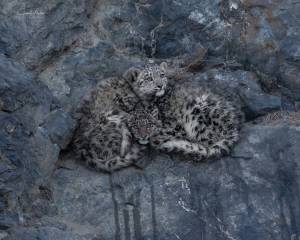Pakistan to Declare Snow Leopard as International Symbol of Climate Adaptation

Islamabad: During “Pakistan Wildlife Protection Awards, 2024” ceremony, Romina Khursheed Alam, Coordinator to the Prime Minister on Climate Change, reaffirmed Pakistan’s commitment to designate the snow leopard as an international symbol of high mountain ecology and climate adaptation. This declaration highlights the nation’s dedication in combating climate change and preserving its unique wildlife.
The upcoming Conference of the Parties (COP29) of the (UNFCCC) United Nations Framework Convention on Climate Change, scheduled for November 11-22, 2024, in Baku, Azerbaijan, provides a prime opportunity to promote the snow leopard as a global symbol of high mountain ecology and climate adaptation.
During the 8th Global Snow Leopard and Ecosystem Protection Program (GSLEP) steering committee meeting in Samarkand in March 2024, the committee reaffirmed the significance of the snow leopard in high mountain ecosystems. It was agreed to request the UN Secretary-General to officially recognize the snow leopard as a powerful international symbol of high mountain ecology and climate adaptation.
Asia’s high mountains, often referred to as the “third pole of the Earth,” are home to the world’s 14 highest peaks and are experiencing warming at twice the rate of the Northern Hemisphere. This accelerated warming is impacting glaciers and ecosystems across regions including the Himalayas, Hindu Kush, Pamir, Tien Shan, Altai Mountains, and the Tibetan Plateau. Pakistan, which is one of the five countries most vulnerable to climate change and steward of 80,000 square kilometres of snow leopard habitat, has seen significant glacier retreat over the past two decades–affecting agriculture, water supplies, hydroelectric power, and wildlife habitats.
Romina Khursheed Alam emphasized the need for both national and international cooperation to tackle climate change challenges. “Climate change poses a significant threat to our ecosystems and wildlife. Rising temperatures and extreme weather events are altering habitats and putting pressure on vulnerable species. We must strengthen our conservation efforts and work together to mitigate these impacts,” she stated. Romina further highlighted that “recognizing the snow leopard as an international symbol of climate change resilience will enhance Pakistan’s image as a nation demonstrating sustainable and harmonious development with nature”.
Dr. Muhammad Ali Nawaz, Director of the Snow Leopard Foundation, expressed gratitude for the motivation to perusing the recognition of the snow leopard as an international symbol. He emphasized the significance of this moment for wildlife preservation and noted that in 2007, Snow Leopard Foundation (SLF) Pakistan scientists tracked a snow leopard in Chitral, revealing the need for transboundary conservation efforts as the leopard traversed 1,600 square kilometres between Afghanistan and Pakistan.

Dr. Nawaz also highlighted the formation of the GSLEP in 2013, an alliance of 12 countries (Afghanistan, Bhutan, China, India, Kazakhstan, Kyrgyz Republic, Mongolia, Nepal, Pakistan, Russian Federation, Tajikistan, and Uzbekistan) committed to protect snow leopards and their habitats. Pakistan’s role in GSLEP underscores its leadership in wildlife conservation.
GSLEP Emissary and wildlife ambassador Sardar Jamal Khan Leghari expressed optimism about this initiative, stating that “it will reinforce efforts to protect the snow leopards and enhance Pakistan’s reputation as a leader in sustainable development”. He emphasized the urgent need for action to address climate challenges in the “Third Pole” region.
“Snow leopards, residing near snow-capped peaks, symbolize healthy mountain ecosystems, climate resilience, and biodiversity conservation. They play a crucial role in providing essential ecosystem services such as freshwater supply and carbon sequestration, benefiting billions of people downstream.” He stated.
Pakistan remains committed to its National Climate Change Policy, which seeks to balance economic growth with efforts to mitigate climate change, adapt to its impacts, prevent land degradation, and preserve biodiversity.
Also read: Mann Jogi Redefining Pakistani Television—A Must-Watch








